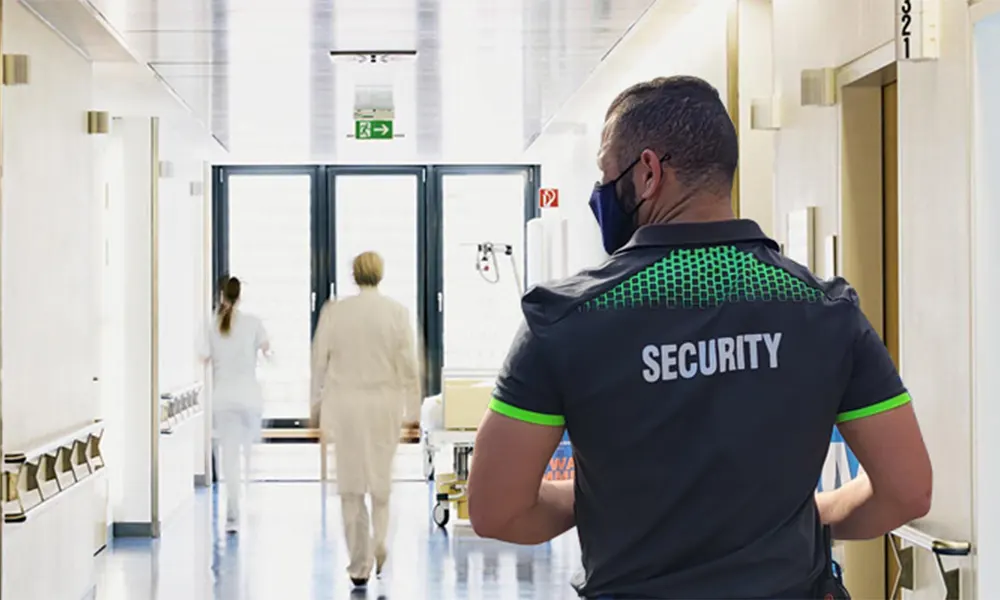Effective crisis management is essential for minimising the impact of security concerns, maintaining continuity of operations, and safeguarding the well-being of individuals within a healthcare facility. In today’s discussion, we delve into the critical role of crisis management in healthcare settings and the indispensable contribution of security measures in mitigating risks and ensuring the safety of patients, staff, and visitors.
The Role of Security in Crisis Management:
Proactive Risk Assessment:
Security professionals play a crucial role in conducting proactive risk assessments to identify potential threats and vulnerabilities within healthcare facilities. By evaluating factors such as facility layout, emergency preparedness plans, and historical data on security incidents, security teams can develop comprehensive risk management strategies tailored to the unique needs of the institution.
Crisis Response Planning:
Security personnel collaborate with hospital administrators, emergency management teams, and relevant stakeholders to develop crisis response plans that outline protocols for various scenarios.
These plans include procedures for evacuations, lockdowns, medical emergencies, and security breaches, as well as communication strategies for disseminating information to staff, patients, and external agencies.
Hospital Crisis Response:
Importance of Effective Crisis Response:
Crisis situations in hospitals can range from natural disasters like earthquakes or floods to medical emergencies, security breaches, or infectious disease outbreaks.
Regardless of the nature of the crisis, an effective response is critical to minimising harm, maintaining essential services, and ensuring the safety of patients, staff, and visitors.
Coordinating Response Efforts:
Security teams serve as the linchpin in coordinating the hospital’s response efforts during a crisis. They work closely with hospital administrators, emergency management teams, and relevant stakeholders to implement established protocols and ensure a coordinated approach to the situation.
This involves clear communication, quick decision-making, and efficient deployment of resources.
Securing the Premises:
One of the primary responsibilities of security teams during a crisis is to secure the premises to prevent further harm or unauthorised access.
This may involve locking down certain areas of the hospital, restricting entry points, and ensuring that only authorised personnel have access to critical areas. Securing the premises helps maintain order and control during chaotic situations.
Managing Access Control:
Security personnel are responsible for managing access control during a crisis, ensuring that only essential personnel are allowed entry into the facility.
They verify credentials, authenticate identities, and enforce access control policies to prevent unnecessary traffic and maintain security.
Managing access control helps prevent interference with emergency response efforts and ensures the safety of everyone within the hospital.
Providing Support to Emergency Responders:
Security teams provide crucial support to emergency responders, including firefighters, paramedics, and law enforcement officers, during a crisis.
They assist with crowd control, traffic management, and securing areas for emergency medical treatment. By collaborating closely with emergency responders, security personnel help facilitate a swift and effective response to the crisis.
Facilitating Evacuation:
In situations where evacuation is necessary, security teams play a key role in facilitating the process safely and efficiently. They assist with directing patients, staff, and visitors to designated evacuation routes, providing guidance and support as needed.
Security personnel may also coordinate transportation arrangements and ensure that vulnerable individuals are prioritised during the evacuation process.
Serving as Liaisons:
Security personnel serve as liaisons between internal departments, external agencies, and the community during a crisis. They relay critical information, coordinate resources, and facilitate communication between various stakeholders to ensure a unified response.
By serving as effective communicators and problem-solvers, security teams help streamline the crisis response effort and minimise confusion or misunderstandings.
Ensuring a Coordinated Response:
Overall, the role of security teams during a hospital crisis is to ensure a coordinated and effective response that prioritises the safety and well-being of all individuals involved.
By implementing established protocols, managing access control, providing support to emergency responders, and facilitating evacuation procedures, security personnel contribute to maintaining order and mitigating the impact of the crisis.
Healthcare Incident Management:
Security professionals are trained to manage various healthcare incidents, including medical emergencies, patient elopement, violence, and infectious disease outbreaks. They possess the skills and knowledge to assess the situation, initiate appropriate interventions, and ensure the safety and well-being of individuals within the facility.
Security teams work closely with healthcare staff to provide assistance and support during emergencies, demonstrating a collaborative approach to incident management.
Communication and Coordination:
Effective communication is essential during a crisis to ensure that accurate information is disseminated promptly to all stakeholders.
Security teams use communication systems, such as two-way radios, intercoms, and mobile devices, to coordinate response efforts and relay instructions to staff and patients.
They also liaise with external agencies, such as law enforcement, fire departments, and emergency medical services, to facilitate a unified response to the crisis.
Post-Incident Evaluation and Improvement:
Following a crisis, security teams conduct post-incident evaluations to assess the effectiveness of response efforts and identify areas for improvement.
Lessons learned from past incidents are incorporated into future crisis response plans, allowing healthcare facilities to enhance their preparedness and resilience against future emergencies.
In conclusion, crisis management is an essential aspect of healthcare security, requiring proactive planning, effective response, and continuous improvement. Accord Security, with its expertise in providing comprehensive security services, plays a crucial role in supporting healthcare facilities in managing crises and ensuring the safety of patients, staff, and visitors.
By collaborating with hospital administrators, emergency management teams, and external agencies, security professionals contribute to the development of robust crisis response plans and the implementation of effective security measures.
In times of crisis, the presence of a skilled and responsive security team is indispensable for maintaining order, minimising risks, and safeguarding the well-being of all individuals within the healthcare environment.
